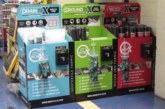
Dave Rowley, Training and Technical Support Manager for Dunlop, explains how merchants can help enhance their bottom line through effective staff training programmes.
When it comes to ensuring repeat business from installers and builders, experience shows that what customers value more than anything are knowledgeable counter staff who are able to deliver trusted advice on products and installation techniques.
Switched on merchants know that installers are open to advice on selecting the right products for their job — and this is particularly important when they’re buying products for tiling projects. This is because using the wrong adhesive or grout on a job — or a failure to adequately prepare backgrounds before tiling — can sometimes lead to disastrous consequences such as the cracking or de-bonding of tiles, causing financial and reputational damage to both installer and stockist.
When advising on adhesives or grouts for tiling, sales staff must understand that there are a number of factors which need to be taken into account including the background substrate (i.e. concrete, plaster, timber), environment (i.e. wetroom, conservatory, kitchen), and the type and sizes of the tiles, for instance large format, mosaic, natural stone, porcelain or ceramic.
Certain adhesives and grouts are only suitable for certain installations. For example, you would not recommend a ready-mixed adhesive for fixing floor tiling or large format tiles, while flexible or deformable adhesives and grouts should be recommended where there is limited movement or vibration.
Many stockists make the error of recommending an adhesive or grout based solely on certain elements of their EN classification. This is not always the correct approach — as other factors may necessitate the selection of a tile adhesive with a different EN classification.
Merchants should also consider the potential opportunities for cross-selling ancillary tiling products when speaking to customers. For example, if they are tiling a shower or wetroom, one should be recommending a waterproofing kit to ensure that water doesn’t permeate through the adhesive and grout and damage the background.
It might be that an uncoupling mat — also known as a decoupler or an anti-fracture mat — is required, for example underfloor heated screeds or on a wooden floor. Sealants may also be recommended for movement joints, around perimeters, sealing baths and showers and internal corners.
Knowing how to achieve and maintain this level of product knowledge and installation know-how day-in day-out is a major challenge for merchants, and even the best often need help with it. This is why at Dunlop we champion the use of product or project specific training courses to increase your sales and ultimately your market share.
Developing your product and sales knowledge helps your sales staff to identify a customer’s current and future needs more easily and gives them the confidence to sell higher ticket items, resulting in tangible benefits for your business.
At Dunlop we have recently launched a new Training and Technical Support Team of four former fixers. If you want to upskill your staff, we can work with you to arrange bespoke training at our Innovation and Technology Centre (ITC) in Stoke-on-Trent for up to 40 members of staff — alternatively, if you can’t come to our ITC we can always bring the training to you at a branch of your choice.
Technical knowledge of tiling can help you overcome the barrier to a sale and make sure your customers are doing the job right with the right products, every time.
For more information on Dunlop’s merchant training programmes, visit www.dunloptrade.com/training.









